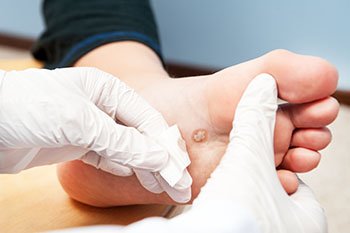
Plantar warts are affected areas of the skin on the bottom, or soles, of the feet. Importantly, the plantar warts are spread by the human papillomavirus. There are certain areas and environments in which the spread of this virus is more likely or expected. For example, public swimming pools are a primary breeding ground for the development of plantar warts. This is because many people are often walking around the sides of pools without any shoes. Also, this virus thrives in moist, warm environments. There are several things that you might consider doing to protect your feet from developing plantar warts if you regularly frequent public pools. Most importantly, you might consider simply wearing flip flops or some form of foot protection when walking around the pool. This protects the feet from making contact with any substances that can lead to the development of plantar warts. Contact a podiatrist today for more information.
Plantar warts can be very uncomfortable. If you need your feet checked, contact Dr. James D. McAlexander from Gig Harbor Foot and Ankle Clinic. Our doctor will assist you with all of your foot and ankle needs.
About Plantar Warts
Plantar warts are the result of HPV, or human papillomavirus, getting into open wounds on the feet. They are mostly found on the heels or balls of the feet.
While plantar warts are generally harmless, those experiencing excessive pain or those suffering from diabetes or a compromised immune system require immediate medical care. Plantar warts are easily diagnosed, usually through scraping off a bit of rough skin or by getting a biopsy.
Symptoms
- Lesions on the bottom of your feet, usually rough and grainy
- Hard or thick callused spots
- Wart seeds, which are small clotted blood vessels that look like little black spots
- Pain, discomfort, or tenderness of your feet when walking or standing
Treatment
- Freezing
- Electric tool removal
- Laser Treatment
- Topical Creams (prescription only)
- Over-the-counter medications
To help prevent developing plantar warts, avoid walking barefoot over abrasive surfaces that can cause cuts or wounds for HPV to get into. Avoiding direct contact with other warts, as well as not picking or rubbing existing warts, can help prevent the further spread of plantar warts. However, if you think you have developed plantar warts, speak to your podiatrist. He or she can diagnose the warts on your feet and recommend the appropriate treatment options.
If you have any questions please feel free to contact our office located in Gig Harbor, WA . We offer the newest diagnostic and treatment technologies for all your foot and ankle needs.
